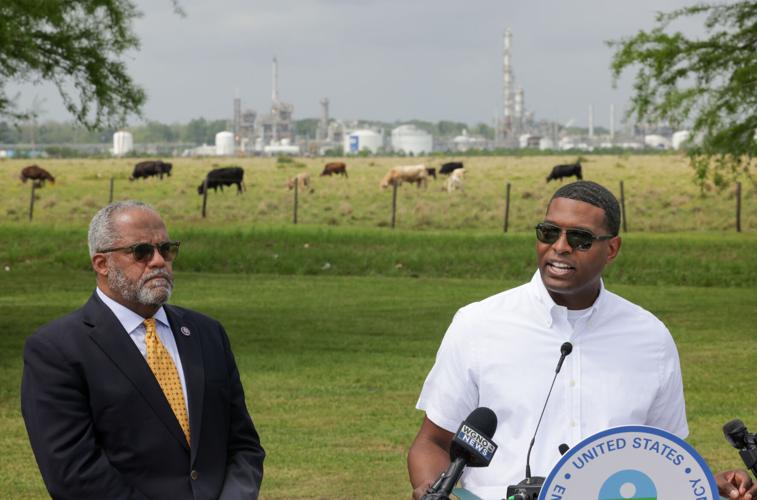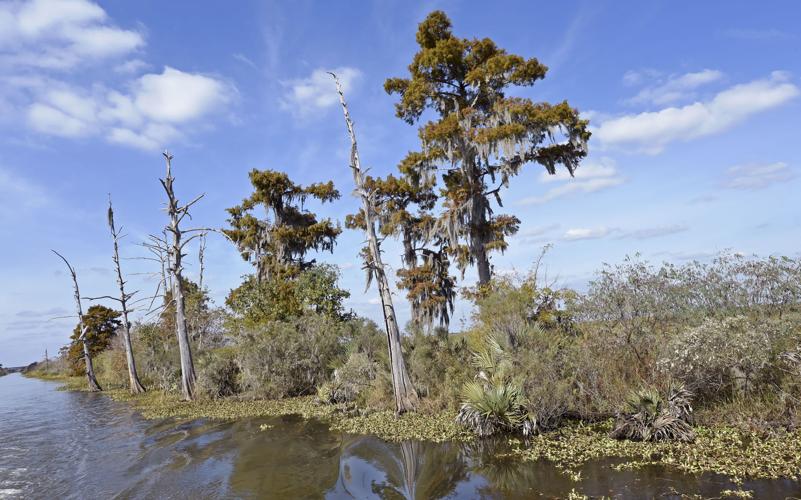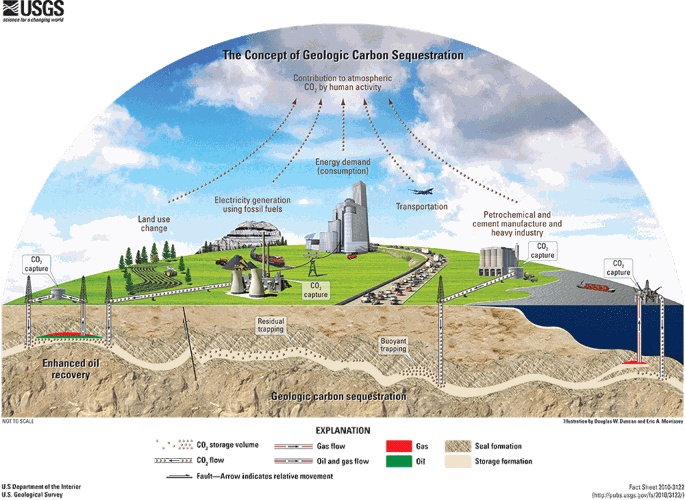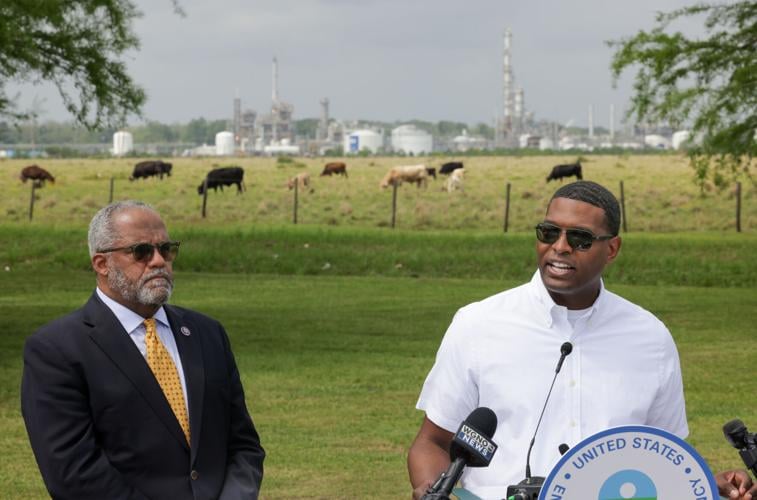President Joe Biden's administration is handing Louisiana regulators new power to attract and approve carbon capture projects at a time when the state’s influential energy sector wants to make the Gulf Coast a hub for the rapidly expanding industry.
Louisiana will be able to issue permits for wells that store carbon dioxide, a critical component of carbon capture and removal technology. In all but two other states, the U.S. Environmental Protection Agency is responsible for permitting. Proponents of the change say it will speed up approvals of new projects that are critical for reducing climate-warming greenhouse gas emissions.
Environmental groups had opposed the move, doubting that a state home to a concentrated stretch of oil, gas and petrochemical plants commonly called “Cancer Alley” is capable of proper industry oversight and protecting residents. But the EPA said the Louisiana agreement includes safeguards to protect poorer, often majority-Black communities that live near those facilities — and that those standards will serve as a model for other states.
“It can be done in a way that builds in environmental justice principles that allow for the community to participate in the process and ensures that these communities are safe,” EPA Administrator Michael Regan said Thursday.
In a news release, Regan said the decision to grant Louisiana "primacy" followed consultation with community leaders, advocates and stakeholders, and public input that included four public hearings and more than 45,000 comments.
"EPA has built robust provisions into an enforceable Memorandum of Agreement with Louisiana that requires the state to take specific actions to protect communities from any current or future environmental hazards associated with Class VI well injection, with a focus on protecting those most vulnerable to pollution," Regan said in the news release.
In his own announcement about the move, Gov. John Bel Edwards stressed that Louisiana would attempt to make carbon capture work hand-in-hand with the state's traditional oil and gas exploration and production industries.
“Finding alternative means of harnessing our traditional fuel sources at the same time we expand our options for alternative fuel sources to the point they are market-ready, available and affordable is probably the great challenge of our generation and some of the most important work we can do for future generations,” Edwards said. “While CO2 sequestration is not the only strategy available for carbon management, it is the most mature and market-ready tool available in the near term.”
The state expects to see 22 applications pending in EPA's Region 6 office in Dallas to be transferred to Louisiana's Department of Natural Resources, Patrick Courreges, a department spokesperson, said Thursday evening.
Courreges said the department already has expanded its staff to handle the new tasks and will work with EPA officials to determine how to move forward with that large workload.
Louisiana submitted its application to EPA in September 2021, and will add oversight of the drilling of these deep wells to its existing permitting for injection of hazardous and radioactive wastes.
The Biden administration has said enhancing environmental justice is a priority and that it would focus its enforcement power on communities already burdened by too much pollution. The EPA said it secured commitments from Louisiana to have a robust public participation process and to consider how new wells might harm communities near polluting sites and possibly reduce harm.
Carbon capture is aimed at reducing emissions from industrial sources like ethanol plants and coal-fired power plants. The captured carbon can be transported for injection in wells deep underground. It is these wells that Louisiana will now have the power to approve.
The Biden administration has increased tax breaks for developers of carbon capture projects and provided large grants, including for an ambitious plan in Louisiana to remove carbon directly from the air. Developers have responded, flooding the EPA with permit applications for new wells, but only a handful of carbon capture projects are currently operating and few wells have been approved so far.
In Louisiana, developers have proposed roughly 30 carbon-capture projects, among the most of any state, according to a tracker maintained by the climate-focused group Clean Air Task Force.
Edwards and other political leaders argued that the state's robust petrochemical industry along the Mississippi River, geology that’s well suited for carbon storage, and plenty of existing infrastructure make it the perfect place for carbon-capture development.
In his news release, Edwards outlined key restrictions to be included in the state's regulations:
• Louisiana will not grant waivers to injection depth requirements
• Louisiana prohibits sequestration of CO2 in salt caverns
• Louisiana will not issue area permits for multiple wells at once, requiring each individual well to be reviewed and permitted on its own
• Louisiana requires additional measures for monitoring systems and operating requirements
“We certainly want Louisiana to be able to develop opportunities for economic growth in the emerging market for carbon management,” said Department of Natural Resources Commissioner of Conservation Monique Edwards, who will oversee the program. “But we cannot and will not sacrifice our duty to ensure that operations are conducted in a way that is protective of public safety and the environment.”
Carbon capture was a major focus of the state's 2022 Climate Action Plan, one of the few such plans aimed at reducing carbon emissions throughout the state's economy in the Deep South.
Environmental groups are doubtful the state will properly regulate carbon-capture wells. They also question the potential of carbon capture, with some arguing that it’s an excuse to delay or prevent the rapid phase-out of oil, gas and coal that is needed to halt climate change.
They point to statements like those made by Louisiana Sen. Bill Cassidy, R-Baton Rouge, who advocated for EPA to grant permitting authority to Louisiana. Cassidy argued that producing oil and gas is vital for the state’s economy and that “many of these energy producers want to invest in carbon capture and sequestration so they can keep operating in Louisiana long into the future.”
Opponents argue that prolonging the life of a polluting industry will harm people who live nearby, which are too often poorer, minority residents.
The EPA invited public comment on the state’s request in April, when it proposed approval. Among those objecting was the environmental group Earthjustice, which said the state is “notorious for weak monitoring and enforcement” and that it hasn’t shown it will adequately protect drinking water.
Clara Potter, an attorney with the Tulane Environmental Law Clinic who represented the Sierra Club and another preservation group in opposing the EPA's move, said she was disappointed with the EPA's decision. She said carbon-capture projects in Louisiana have served “as an excuse for permitting new and expanded polluting operations.”
That increased air pollution “will be born most heavily by Black and Brown communities who already face disproportionate environmental risks,” she said in a statement.
The Biden administration has focused attention on Louisiana and its pollution. Regan has visited the state, promising to do better by communities there. Last year, the EPA accepted complaints from activist groups in Louisiana that asked the agency to investigate the state's regulation of air emissions. The agency initially said there was evidence of racial discrimination, but dropped the investigation before releasing a final report.
Regan says the agency followed its legal obligation to approve the state's application to administer its own permitting program because it meets the Safe Drinking Water Act's requirements. The state standards must be at least as strict as federal rules.
“We're building in monitoring and oversight measures to ensure that the state — regardless of who is in the governor's office — complies" with the law, Regan said.
North Dakota and Wyoming are the other two states with permitting authority. North Dakota, the first state to be granted authority, issued its fourth well permit in May and an ethanol producer is currently capturing and storing carbon there.
Texas, Arizona and West Virginia also want to run their own permitting program.
-Staff writer Mark Schleifstein contributed to this story. The Associated Press receives support from the Walton Family Foundation for coverage of water and environmental policy. The AP is solely responsible for all content. For all of AP’s environmental coverage, visit https://apnews.com/hub/climate-and-environment





